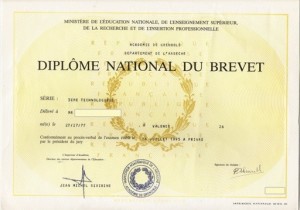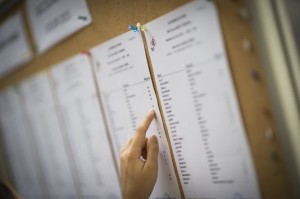Last winter Antibes came to us in Toronto. Lolo’s friend – a former classmate from her preschool days in Juan-les-Pins – passed through town with her family. One snowy day in early March, Lolo brought Anaë to school for show-and-tell.
Anaë was a superstar that morning. A couple dozen ten-year-old heads craned toward the hallway to get an early glimpse of the real French girl who came to visit. Where did she live? How long did she go to school every day? Does it ever snow? Can she truly eat croissants for breakfast every morning?
The real French girl stimulated authentic, invested conversation in Lolo’s French class that morning. When the session ended, Anaë wanted to remain in school for the rest of the day. When she was due to leave Toronto altogether, she wondered whether she could attend school in Toronto. It was simply more fun.
Anaë’s comment hardly surprised me. Over the years The Economist, for one, has devoted countless column inches to the beguiling subject of French education. It has linked the country’s system of rote learning and harsh grading to a lower level of confidence. The result, the magazine says, is a lack of “la positive attitude”.
The commentators recently have become more concrete. After an OECD report highlighted the rising inequalities within France’s school system, the country’s education minister acknowledged some students miss out on basic knowledge. The biggest problems lie in a group of years called (confusingly for Anglophones) collège.
Collège is effectively a four-year, French middle school starting in Grade 6 and running through Grade 9. This set-up leaves three additional years for French lycée, or high school, before university.
Among other things, France’s collège reforms, slated to start in September 2016, should make school more “fun” by encouraging teamwork and interdisciplinary studies. Teachers will have additional freedoms in drawing up their lesson plans. As it happens, The Economist cites Ontario – the home of Lolo’s school – as one of the best global examples where this whole autonomy initiative has flourished. Truth be told, the vagaries of looser lesson plans and examination schedules still plague me. I learned it old-school.
So French Lessons is interested in yet another us-versus-them idiosyncrasy. As ever, we hardly go for weighty research, but instead we ask questions to those invested the most: folks who live here with kids. To be totally upfront, ours is hardly a representative sample of France’s education:
- The foreign locals we questioned usually had more interesting things to say. They had stronger opinions than the true locals did, perhaps because they’ve witnessed education elsewhere.
- The group here contains more than the requisite dose of semi-private schools (those that are essentially private, except for the fact that they follow the national curriculum and the State pays teachers’ salaries).
- This is the Côte d’Azur. Frenchmen, near and far, wonder whether this region belongs in their country in the first place.
Even with these defects to proper, statistical assessment, the feedback is intriguing.
“I can give you stacks of info on the subject,” my American friend Kristine says as we lunch on a hillside patio one sticky day. Her 11-year-old daughter heads into collège this September.

“The interdisciplinary teaching could be good,” she says, “but the French are resistant to change.”
Of course they are. Change is bad, it seems, even when it offers greater autonomy. The teachers already have been out on strike.
Malin agrees with Kristine’s assessment. I mention the whole collège thing to her at a morning exercise class. The overwhelming refusal to alter anything in France, particularly something as established as the educational system, is her first point.
“Will anything change at all?” she wonders as we pause between exercises. “It has been this way for the last 50 years, and look how well everything is going. Why change now? My kids are learning the same things my husband did when he was in school!”

Malin, I should say, is Swedish. Her husband is, by context, French. “We should get a coffee,” she says. “There’s too much to say.”
Soon I find out that Malin’s son is headed to collège next year – and thanks to decent entry exam marks, he got into his school of choice. He’s headed for an international program that offers joint French and US degrees. On graduating from lycée, he will earn both a French baccalauréat and a US high school diploma.
In Toronto, friends and family send their kids to slog it out for an international baccalauréat. In France, bright kids like Malin’s son work double-time to get a high school diploma, bestowing an aura on a certificate that barely receives recognition in North America.

What about harsh grading? I ask my Swedish friend whose daughter enters her final year of an international program at collège next year. Does tough grading still happen? Are students less likely to grow as a result?
“Stressful grading happens all the way through collège,” Malin says. “When teachers hand back exams, they announce the top and bottom scores – along with who, exactly, earned these marks.”
Sam remembers those school days all too clearly. Having graduated from her French lycée only three years ago, she shudders in recalling such a class as Malin mentions. Tests were out of 20 points. As the teacher handed back exams, Sam listened for her name with dread. One classmate might earn a 19, and everyone would know it. Another might get a six, and everyone knew that, too.
Tu es nulle. You are useless. You are nothing. When we chose to put Lolo in preschool in France – gosh, seven years ago now – it was that concept that filled me with dread. My instructor at Alliance Française had said the phrase was an effective motivational tool used in French schools. I mention it to Malin.
“Tu es nulle is alive and well,” she says. She pauses to reflect. “But if you tell a student they are nulle, what do they think? I’ll just be happy to get ‘a’ job? Or do they set their sights even lower?” Malin pauses over her coffee. “The whole school system in France must affect the atmosphere at work. You are there for so many years!”

To up the ante in her daughter’s collège, students and their parents can track exam scores in real time. Every day, after every exam, a website displays movements in the student’s personal academic curve. And there, alongside details of each student’s curve, are the best, the worst and the average marks for the class.
Pulling Latin from the curriculum at some collèges – another piece in the proposed reforms – is a big deal here as well. Malin flags the issue while we sip our coffees – but it’s the headline for Véronique, an Antibes native, when I ask her about the upcoming changes. She also deplores a planned delay in studies about French history, such as the reign of Napoléon, in order to make room for a more diversified survey of the country’s roots.
“They’re trying to make French education equal for all,” she says, “but they’re making it all equal on the bottom rung.”
Still, I’m most intrigued by this concept of “fun” learning – the idea 10-year-old Anaë planted in my brain when she visited Toronto last March. Good, interdisciplinary teaching, I know, doesn’t happen by osmosis. The instructors at Lolo’s “fun” school in Toronto (an institution known for its highly interdisciplinary and student-motivated methods) attend special training sessions across the city, country and planet. They put on courses for others, too.
Malin’s daughter gets a taste of both approaches in her international program. The subjects presented in English – whether history, geography, literature or whatever else – are taught by Brits or Americans. My Swedish friend finds these Anglophone teachers “much more approachable.” She says they “make classes more fun.”

Take literature. Malin’s daughter studied Balzac and Shakespeare last year. She hated Balzac, finding it dense and dry, but she actually enjoyed Shakespeare. To be sure, the students studied the original texts, but they also read a contemporary book involving time travel back to Shakespeare’s day. They made a movie of Romeo and Juliet. The class even took a trip to London’s Globe Theatre, where a Shakespearean play unfolded before them in the round.
For my friend Kristine, the schooling issue is more than purely academic, fun or otherwise. As an American, she’s used to a different cultural formation for children. “No one is ever sorry for doing something wrong here,” she says. “No one ever will take the blame. What do you think that teaches children growing up in the school system?”
It’s a jarring thought for someone with a daughter growing up in Canada. Canadians are famous for being sorry. In all circumstances, at all times. When I was pulled over for speeding in Toronto a few years back, the officer actually stopped me speaking. Yes, he understood – for the sixth time – that I was sorry. And I’m not even Canadian.
But Kristine has a point. Apology – even a perceived mildness of manner – puts me at the back of the queue with clerks from the sporting goods store to the boulangerie and wretched phone company alike. In order to survive in a society known for unflinching blamelessness, you need to learn another way. Admit weakness or – quelle horreur – to doing something wrong, and you will be squashed.
So what doesn’t happen at school, then, must happen at home. Back in the academic realm, Malin’s children have about two hours of homework every night, she says. Sometimes it’s more. There’s even homework during the holidays – all of them except for summer.
(I should note that a true summer break is hardly a privilege for all. A few days ago Lolo invited the daughter of our local friend Véronique to play. The 10-year old was delighted to visit. She’d been stuck at home doing math homework.)
Malin’s daughter once told her, “Mom, I don’t even know if I want holidays because I know how much homework I’ll have.” What’s more, my Swedish friend finds that heaps of holiday homework punishes the whole family. The family restricts their travels to allow ample time for homework.
“Are French students so much better in the world once they come out [of school]?” she wonders.
At the end of each academic year, students can look forward to a summary of their results and a personalized comment. No matter what the assessment, Malin says, the comment section always includes the word mais. But. Her daughter’s report might declare, “Bon travail (Good work), mais too much bavardage (talking).” Her son, who has yet to reach collège, sees this all-balancing term as well: “Bien (Good), mais more discipline in the courtyard.”

To pass beyond the prickly world of collège and move successfully onto lycée, French students (unsurprisingly) take an exam. The much trumpeted and widely tormenting brevet consumes the attentions of collège teachers and final-year students to such a degree that, unofficially anyway, the school year wraps up early for all other collège grades. Malin could have sent her daughter to school in the last two weeks of June, but there weren’t any classes. No one was there.

The brevet clearly matters. Not only does it unlock the next academic step for students, but everyone knows how well they did, too. Results – broken down by region, city, school and individual student name – are blasted across newspapers, posted on school gates and even published online. Interested parents, teachers, uncles, neighbours, friends and enemies can see whether Camille Provencher or Jean-Louis Boulanger received a mention très bien, mention bien, mention assez bien, or no mention at all in passing the test. Or if a student’s name doesn’t appear on the list – well, that’s not good at all. He languishes at the bottom of the heap among the refuses. This year 14% fell into that category, a slight improvement on 2014.
If public shame fails to provide enough persuasion for students to hunker down, a little bribery might. The département of the Alpes-Maritimes – basically this Riviera region in southern France – paid 100 euros to each student receiving a mention très bien on the brevet this year. That turned out to be about 10% of all students in the region. For top marks on the baccalauréat, the exam on leaving lycée, the government shelled out 200 euros a pop.
Recent grad Sam questions the fairness of the big exams. What if a student works hard all year and messes up on the exam this one day? she asks. What if a student doesn’t handle stress well? Such was the fate of one friend.
“There are no A’s, B’s and C’s here like in the US,” she says. “I think that would be better.”
Kristine, the American, says she’ll give collège a go for her daughter next year despite the academic rigidities and the differing cultural mores – but that may be it. She’s already drawn to enrolling her daughter back in the US.
Malin, on the other hand, draws her line at university. “It’s a question of fun versus a really, really cut-throat attitude,” she says. Her French husband attended middle school in the US, and he still talks about that country’s universities offering strong academics alongside a full university life. Their children listen in. Now neither daughter nor son wants to attend university in France.
“You need to get the best education,” Malin says of France’s next generation. Then she adds, “And even if you have the best education here, you might not get a job.”
What fun is that?


Loved this week’s French Leason and what a great way to learn! our French exchange program is full of much of the same discussion among our students who spend 6 weeks living with a French family and attending school and our French guests who come to our school for 6 weeks!
Merci, Deryn! The conversation goes on! Love that it happens in all sorts of formats and places. j